

Probiotics & Neutropenic Diet. Micronutrients & Herbs Guidelines & Reviews in Cancer. Taste Function in Adults Undergoing Cancer Radiotherapy or Chemotherapy, and Implications for Nutrition Management: A Systematic Review - Journal of the Academy of Nutrition and Dietetics. Breslin P.A.S.
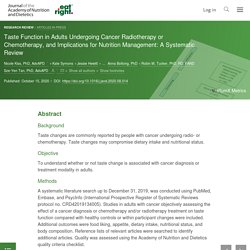
Spector A.C. Mammalian taste perception.Current Biology. 2008; 18: R148-R155Spotten L.E. Corish C.A. Lorton C.M. et al.Subjective and objective taste and smell changes in cancer.Ann Oncol. 2017; 28: 969-984Keast R. Flavour interactions at the sensory level.in: Taylor A.J. Nutrition in Cancer Care: A Brief, Practical Guide With a Focus on Clinical Practice. Could ketogenic diet “starve” cancer? Emerging evidence: Critical Reviews in Food Science and Nutrition: Vol 0, No 0. Acknowledgments.
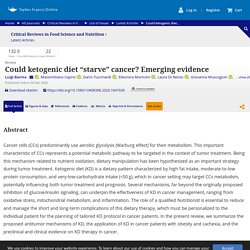
Nutrition in Cancer Therapy in the Elderly—An Epigenetic Connection? 1.
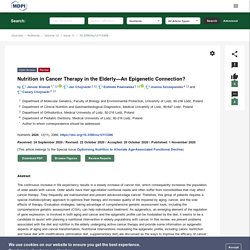
Introduction Aging of societies implies an increasing number of cancer diagnoses in the elderly [1]. As older adults have substantially different nutritional needs than their younger counterparts, the question is whether such differences will result in a different response to cancer therapy in the categories of both the efficacy in the target tissue and unwanted side effects. Any kind of cancer therapy is a serious challenge and burden for the patient, so it should be adjusted to the nutritional status of the patient and vice versa.
Effectiveness of Ketogenic Diets on the Survival of Adult Oncological Patients: Nutrition and Cancer: Vol 0, No 0. Taste Function in Adults Undergoing Cancer Radiotherapy or Chemotherapy, and Implications for Nutrition Management: A Systematic Review - Journal of the Academy of Nutrition and Dietetics. Clinical Oncology Society of Australia: Position statement on cancer‐related malnutrition and sarcopenia - Kiss - 2020 - Nutrition & Dietetics. Loss of muscle mass in cancer‐related malnutrition and sarcopenia may simply be related to reduced nutritional intake.2 Alternatively, muscle loss may develop as a result of tumour‐related metabolic alterations or the presence of systemic inflammation.2 This is particularly evident in cancer cachexia, a multifactorial syndrome with a complex underlying pathology.22 While there are similarities across these conditions, it is generally accepted that weight and muscle loss occurring in cancer cachexia cannot be reversed by conventional nutrition intervention.23.
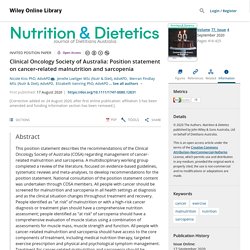
Nutrition during childhood cancer treatment: current understanding and a path for future research - The Lancet Child & Adolescent Health. Assessing Malnutrition Before Major Oncologic Surgery: One Size Does Not Fit All. Outline Graphical abstractMethodsResultsDiscussionConclusionsAuthor ContributionsReferences Tables (3) Table 1Table 2Table 3 Presented at the Southern Surgical Association 131st Annual Meeting, Hot Springs, VA, December 2019.
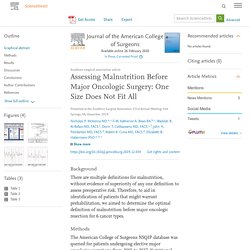
Background There are multiple definitions for malnutrition, without evidence of superiority of any one definition to assess preoperative risk. Methods The American College of Surgeons NSQIP database was queried for patients undergoing elective major oncologic operations from 2005 to 2017. Results We identified 205,840 operations (74% colorectal, 10% pancreatic, 9% lung, 3% gastric, 3% esophageal, and 2% liver). Conclusions The definition of malnutrition used to assess postoperative risk is specific to the type of cancer being treated. View full text. CPE Monthly: Nutrition Therapy for Adults Receiving Radiation Treatment - Today's Dietitian Magazine. May 2019 Issue CPE Monthly: Nutrition Therapy for Adults Receiving Radiation Treatment By Julie Lanford, MPH, RDN, CSO, LDN Today’s Dietitian Vol. 21, No. 5, P. 44 Suggested CDR Learning Codes: 5000, 5150, 5400 Suggested CDR Performance Indicators: 8.1.5, 8.3.1, 8.3.6, 10.2.8 CPE Level 2 Take this course and earn 2 CEUs on our Continuing Education Learning Library The number of people living after a diagnosis of cancer continues to grow in the United States.
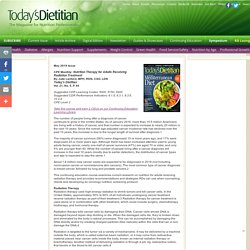
As of January 2016, more than 15.5 million Americans are living with a history of cancer, and that number is expected to increase to nearly 20 million in the next 10 years. The majority of cancer survivors (56%) were diagnosed 10 or more years ago, and 17% were diagnosed 20 or more years ago. About 1.8 million new cancer cases are expected to be diagnosed in 2019 (not including noninvasive cancer or nonmelanoma skin cancers). SEOM clinical guidelines on nutrition in cancer patients (2018)
Disease-related malnutrition has been defined as a condition resulting from the activation of the systemic inflammatory response by an underlying disease, in this case, cancer [1, 2].
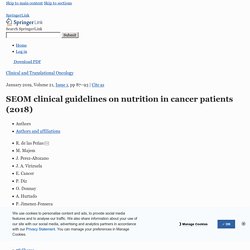
This inflammatory response causes anorexia and tissue degradation, which, in turn, can lead to significant weight loss, alterations in body composition, and decreased functional capacity [2, 3]. Specifically, cancer cachexia is a multifactorial syndrome characterized by an involuntary, sustained loss of weight and skeletal muscle mass accompanied or not by a loss of fat mass. It cannot be fully reversed by conventional nutritional support and it leads to severe functional decline. Personalized Nutrition in Disrupting Cancer — Proceedings From the 2017 American College of Nutrition Annual Meeting: Journal of the American College of Nutrition: Vol 0, No 0. Nutrient Recommendations for Cancer Patients Treated with Pelvic Radiotherapy, with or without Comorbidities. Diagnosis, assessment and management of constipation in advanced cancer: ESMO Clinical Practice Guidelines.
Skip to Main Content Sign In Register Close Advanced Search Online ISSN 1569-8041 Print ISSN 0923-7534 Copyright © 2018 European Society for Medical Oncology Connect Resources Explore.
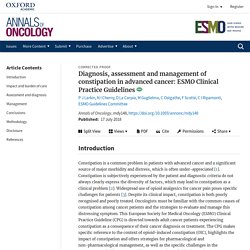
Diarrhoea in adult cancer patients: ESMO Clinical Practice Guidelines. Skip to Main Content Sign In Register Close Advanced Search Online ISSN 1569-8041 Print ISSN 0923-7534 Copyright © 2018 European Society for Medical Oncology Connect Resources Explore Oxford University Press is a department of the University of Oxford.
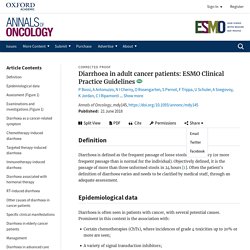
Close. Weight management and physical activity throughout the cancer care continuum - Demark-Wahnefried - 2017 - CA: A Cancer Journal for Clinicians. ESPEN expert group recommendations for action against cancer-related malnutrition. Fig. 1.
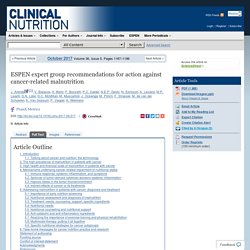
Nutrition Support for Critically Ill Patients With Cancer. Oncology Evidence-Based Nutrition Practice Guideline for Adults. ESPEN guidelines on nutrition in cancer patients. In malnourished or advanced cancer patients, pharmaconutrients and pharmacological agents may be used to target the main pathogenic mechanisms of cancer cachexia. “Pharmaconutrients” are nutrients supplied in pharmacological doses to modulate immune and metabolic functions and exert effects on clinical outcome. However, these agents cannot substitute for conventional or specialized nutritional support. The nutritional needs of cancer patients should be adequately met, independent of pharmaconutrient or pharmacologic treatment. Specific pharmacological agents may be required or helpful in gastrointestinal disorders with relevance to food intake or absorption as well as in states typically associated with decreased appetite, like microbial infections, chronic pain, or psycho-social distress.
This may include the following categories of agents, which are not a topic of this guideline, including suggested recommendations for their use: Consensus Comments Strong consensus Safety issues. Expert consensus on the nutritional therapy for patients with malignancies - Committee - Chinese Clinical Oncology. 1. Introduction Continuous development of cancer treatment technologies and methods has extended the survival time of patients with malignant tumors, making these conditions more of a controllable and curable chronic diseases.
Therefore, maintenance of the quality of life should be a major focus in the modern oncology. As an emerging interdisciplinary subject, nutritional oncology looks into the underlying mechanisms of malnutrition in malignant patients to identify the most appropriate methods for assessing the nutritional risks and status of cancer patients, seeking to improve the efficacy of anti-cancer therapy as well as the quality of life with nutritional therapy. What distinguish this from general nutriology is the abnormal metabolic state in patients with advanced and end-stage cancer as a result of the stress state and constant proliferation of tumor tissues in the tumor-bearing body. 2. Isocaloric ketogenic dietary regimes for cancer patients. Nutrition in Cancer Care (PDQ®) - National Library of Medicine - PubMed Health.